Buddy Holly was an American musician and singer-songwriter whose career spanned from 1952 to 1959. This list includes songs that he recorded as a group leader or a solo artist that have been officially released in various formats. Year indicates when the recording was first released commercially.

Charles Hardin Holley, known as Buddy Holly, was an American singer, songwriter, and musician who was a central and pioneering figure of mid-1950s rock and roll. He was born to a musical family in Lubbock, Texas, during the Great Depression, and learned to play guitar and sing alongside his two siblings.
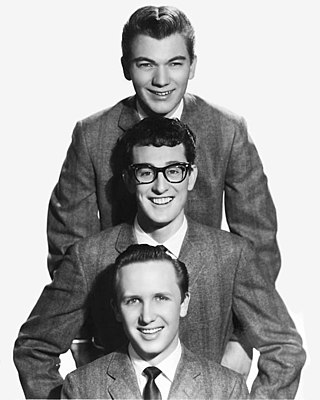
The Crickets were an American rock and roll band from Lubbock, Texas, formed by singer-songwriter Buddy Holly in January 1957. Their first hit record, "That'll Be the Day", released in May 1957, peaked at number three on the Billboard Top 100 chart on September 16, 1957. The sleeve of their first album, The "Chirping" Crickets, shows the band line-up at the time: Holly on lead vocals and lead guitar, Niki Sullivan on rhythm guitar, Jerry Allison on drums, and Joe B. Mauldin on bass. The Crickets helped set the template for subsequent rock bands, such as the Beatles, with their guitar-bass-drums line-up, performing their own material. After Holly's death in 1959, the band continued to tour and record into the 1960s and beyond with other band members through to the 21st century.

"That'll Be the Day" is a song written by Buddy Holly and Jerry Allison. It was first recorded by Buddy Holly and the Three Tunes in 1956 and was re-recorded in 1957 by Holly and his new band, the Crickets. The 1957 recording achieved widespread success. Holly's producer, Norman Petty, was credited as a co-writer, although he did not contribute to the composition.
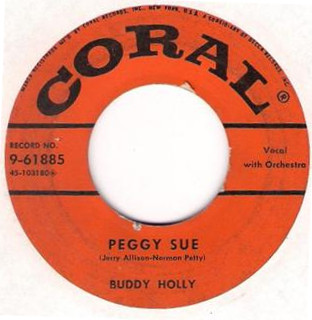
"Peggy Sue" is a rock and roll song written by Jerry Allison and Norman Petty, and recorded and released as a single by Buddy Holly on September 20, 1957. The Crickets are not mentioned on label of the single, but band members Joe B. Mauldin and Jerry Allison (drums) played on the recording. This recording was also released on Holly's eponymous 1958 album.

Jerry Ivan Allison was an American musician. He was best known as the drummer for the Crickets and co-writer of their hits "That'll Be the Day" and "Peggy Sue", recorded with Buddy Holly. His only solo chart entry on the Billboard Hot 100 was "Real Wild Child", issued in 1958 under the name Ivan. Allison was inducted into the Rock and Roll Hall of Fame in 2012.

Norman Petty was an American musician, record producer, publisher, and radio station owner. He is considered to be one of the founding fathers of early rock & roll. With Vi Ann Petty—his wife and vocalist—he founded the Norman Petty Trio.
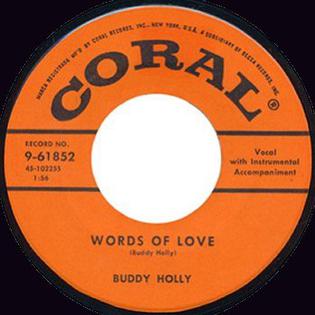
"Words of Love" is a song written by Buddy Holly and released as a single in 1957.

"Rave On", also written "Rave On!", is a song written by Sonny West, Bill Tilghman and Norman Petty in 1958. It was first recorded by West for Atlantic Records, which released his version in February 1958. Buddy Holly recorded the song later the same year, and his version became a hit, one of six of his recordings that charted in 1958. Holly is instantly recognizable as the artist: the record begins with a drawn-out "Well…" as stylized by Holly's distinctive hiccup ("A-weh-uh-heh-uh-ell…").
Sonny Curtis is an American singer and songwriter. Known for his collaborations with Buddy Holly, he was a member of the Crickets and continued with the band after Holly's death. Curtis's best known compositions include "Walk Right Back", a major hit in 1961 for the Everly Brothers; "I Fought the Law", notably covered by the Bobby Fuller Four and the Clash; and "Love is All Around," the theme song for The Mary Tyler Moore Show.
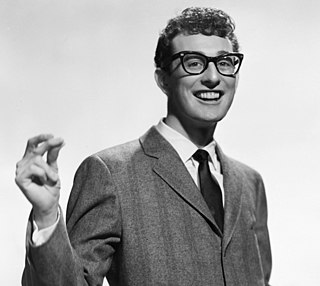
Buddy Holly recorded under several names and with several different backing bands. The Crickets played on almost all of his singles in 1957 and 1958.

"Oh, Boy!" is a song written by Sonny West, Bill Tilghman and Norman Petty. The song was included on the album The "Chirping" Crickets and was also released as the A-side of a single, with "Not Fade Away" as the B-side. The song peaked at number 10 on the US charts, number 3 on the UK charts in early 1958, and number 26 in Canada.
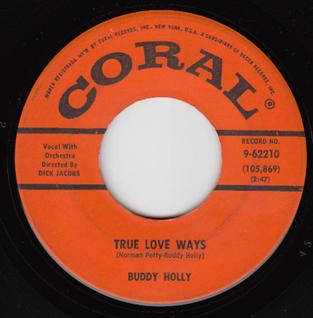
"True Love Ways" is a song attributed to Norman Petty and Buddy Holly. Buddy Holly's original was recorded with the Dick Jacobs Orchestra in October 1958, four months before the singer's death. It was first released on the posthumous album The Buddy Holly Story, Vol. 2, in March 1960. The song was first released as a single in Britain in May 1960, reaching number 25 on the UK Singles Chart. It was released the following month in the US, but did not make the charts. In 1988, a UK re-release of the recording by MCA, the single reached no. 65 on the UK singles chart in a five-week chart run.

That'll Be The Day is the second and final studio album from Buddy Holly. Decca, Holly's first major record label, after failing to produce a hit single from Holly's early recordings, packaged these 1956 tunes after he had some success with recordings from the Brunswick and Coral labels, especially the previously released single "That'll Be the Day". This is the last album released before his death in a plane crash on February 3, 1959, and is rare among collectors.

"Everyday" is a song written by Buddy Holly and Norman Petty, recorded by Buddy Holly and the Crickets on May 29, 1957, and released on September 20, 1957, as the B-side of "Peggy Sue". The single went to number three on the Billboard Hot 100 chart in 1957. "Everyday" is ranked number 238 on Rolling Stone magazine's list of the "500 Greatest Songs of All Time".

"Peggy Sue Got Married" is a song written and performed by Buddy Holly. It was posthumously released in July 1959 as a 45-rpm single with "Crying, Waiting, Hoping". It refers to his 1957 hit song "Peggy Sue". It was one of the first sequels of the rock era.

"Crying, Waiting, Hoping" is a song written by Buddy Holly. It was released in 1959 as the B-side to "Peggy Sue Got Married". Three versions of Holly's recording were released: the 1959 commercial release, the 1964 reissue with different orchestration, and Holly's original, private home recording.

Down the Line: Rarities is a 2009 compilation album of American singer–songwriter and rock and roll pioneer Buddy Holly's alternate takes and demos. It includes the original undubbed "garage tapes" with The Crickets and the "Apartment Tapes", which were recorded in the months before his death. Along with Memorial Collection, this album was released a week prior to the 50th anniversary of Holly's death on January 27, 2009.

Reminiscing is a compilation album by American singer-songwriter Buddy Holly. The album was released as an LP record in both mono and stereo formats in February 1963. Reminiscing was Buddy Holly's third posthumously released album and the second album to feature previously unreleased material. The original recordings were overdubbed by the Fireballs in 1962 and many of the undubbed recordings appeared on For the First Time Anywhere in 1983.

"It's So Easy!" is a rock-and-roll song written by Buddy Holly and Norman Petty. It was originally released as a single in 1958 by the Crickets but failed to chart. It was the final release by the Crickets when Holly was still in the band.
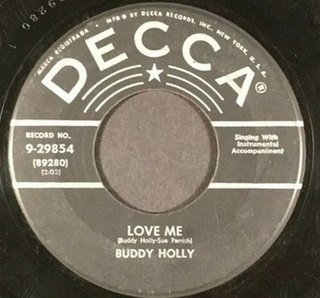
Love Me is the debut single of Buddy Holly. It was released on April 16, 1956, on the Decca Label, backed by "Blue Days - Black Nights". The single was the result of Holly's first recording session at Bradley Studios in Nashville. Due to creative differences, the song represented a more country sound than Holly liked and, paired with lack of promotion, was a commercial failure.